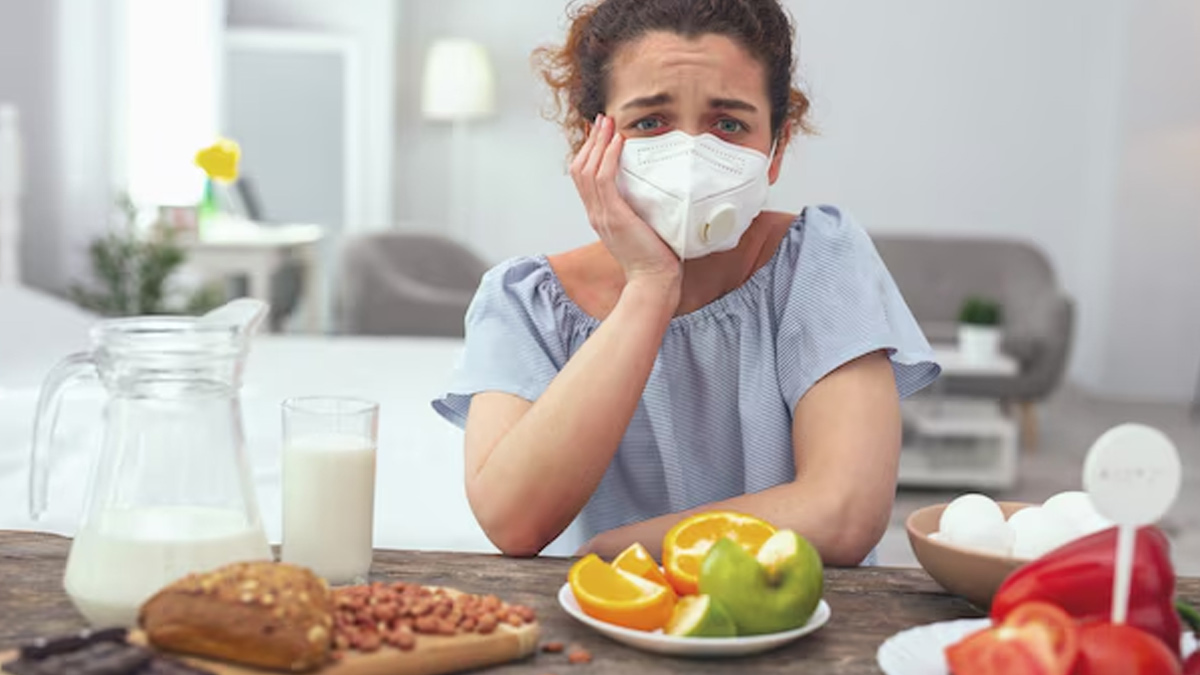
A stomach pain can leave you uncomfortable throughout the day. What’s worse is that several underlying conditions can cause it, and without truly understanding the exact cause, recovery is likely to take time. Two of the most common causes of stomach pain are food poisoning and lactose intolerance. While both can lead to digestive problems, they have different triggers and distinct treatment approaches.
Table of Content:-
The OnlyMyHealth team spoke to two leading experts to discuss the distinguishing factors between food poisoning and lactose intolerance and help you identify exactly what may be causing your stomach pain.
Also Read: Top 6 Foods To Avoid That Can Cause Food Poisoning
Food Poisoning Vs. Lactose Intolerance: What Is The Difference?

Both food poisoning and lactose intolerance can cause digestive issues. However, the two conditions are triggered by different factors.
Dr Deep Kamal Soni, Consultant - Gastroenterology, Indian Spinal Injuries Centre, Vasant Kunj, suggested that food poisoning often comes with sudden, severe symptoms, including nausea, vomiting, diarrhea, fever, and stomach cramps. Symptoms typically appear within hours of consuming contaminated food.
On the other hand, lactose intolerance leads to gradual symptoms such as bloating, gas, diarrhoea, and stomach pain after consuming dairy products. Unlike food poisoning, it does not cause fever or vomiting.
Speaking with the OnlyMyHealth team, Dr Arnab Sarkar, Consultant Gastroenterology, Fortis Hospital, Anandapur, explains that food poisoning mostly occurs due to infections with microbes, such as viruses, bacteria, and parasites. In certain cases, harmful chemicals also contribute to it. On the other hand, lactose intolerance refers to the inability to digest lactose, a sugar found in milk and dairy products, which leads to symptoms such as bloating, diarrhoea, and gas.
While it may be difficult to distinguish between the symptoms of food poisoning and lactose intolerance, here are some key differences to help tell them apart:
- Timing: Food poisoning symptoms appear more rapidly, while lactose intolerance symptoms develop more gradually.
- Severity: Food poisoning symptoms are generally more severe than those of lactose intolerance.
- Fever is more commonly associated with food poisoning.
- The presence of blood or mucus in stools is more likely with food poisoning.
Identifying Common Triggers Of Food Poisoning
According to the World Health Organization (WHO), unsafe food causes 60 crore illnesses and 420,000 deaths each year worldwide. This means that almost 1 in 10 people in the world get sick from foodborne illnesses.
Common triggers include:
- Undercooked or raw food, especially chicken, beef, pork, lamb, and raw oysters.
- Unpasteurised dairy products
- Fresh fruits and vegetables contaminated with bacteria, viruses, or parasites.
- Improperly stored or reheated food
- Food from unsafe sources like street vendors, buffets, or restaurants with poor food handling practices.
- Touching raw meat, poultry, or seafood and then handling other foods without washing hands.
Also Read: What If You Are Lactose Intolerant? Should You Consider Calcium Supplements?
Identifying Common Trigger Of Lactose Intolerance

About 65% of the world's population is lactose intolerant, as reported in MedlinePlus.
Common triggers include:
- Dairy products like milk, cheese, yoghurt, ice cream, and butter.
- Lactose-containing foods, such as bread, cereals, energy bars, and processed snacks.
- Hidden sources of lactose, like medications, supplements, and some foods like pancakes, waffles, and cream-based soups.
- Lactose-containing beverages like milkshakes, smoothies, and creamy coffee drinks.
How Long Do Symptoms Of Food Poisoning And Lactose Intolerance Last?
When it comes to food poisoning, symptoms in mild cases usually last for 1-3 days, whereas in moderate cases, they can last 3-7 days. In severe cases, symptoms can last for 7-14 days or even longer, says Dr Sarkar.
On the other hand, symptoms of lactose intolerance usually begin between 30 minutes and 2 hours after consuming dairy. "The symptoms last until the lactose passes through the digestive system, up to about 48 hours later. The severity of the symptoms can be mild or severe depending on the amount of dairy consumed," the doctor highlights.
Tips To Manage Food Poisoning And Lactose Intolerance

“Managing symptoms of food poisoning and lactose intolerance requires a combination of self-care, dietary changes, and medical attention when necessary,” notes Dr Sarkar. Here are some effective ways to manage symptoms:
Food poisoning:
- Drink plenty of fluids, such as water, clear broth, or electrolyte-rich beverages like coconut water or sports drinks.
- Get plenty of rest.
- Stick to a bland diet of foods like bananas, rice, applesauce, and toast (BRAT diet) until symptoms improve.
- Avoid solid foods until vomiting and diarrhoea have stopped.
- Take anti-diarrhoeal medications.
Lactose intolerance:
- Avoid lactose-containing products like milk, cheese, yoghurt, and other dairy products.
- Take lactase enzyme supplements.
- Try lactose-free or low-lactose products.
- Experiment with non-dairy alternatives like almond milk, soy milk, or coconut milk.
- Manage symptoms with over-the-counter medications like antacids or acid reducers.
A Final Word
According to Dr Soni, if you experience severe dehydration—marked by dizziness, dry mouth, and reduced urination—along with persistent vomiting or diarrhea lasting more than 48 hours, a high fever above 102°F (39°C), or the presence of blood in your stool or vomit, it is essential to seek medical attention immediately. Additionally, chronic digestive issues that persist beyond isolated food-related incidents may indicate an underlying condition that requires professional evaluation and treatment.
For lactose intolerance, see a doctor if you have persistent or severe symptoms like bloating, gas, diarrhoea, or stomach cramps after consuming dairy, especially if these symptoms cause significant discomfort or are difficult to manage with dietary changes or over-the-counter medications, he emphasises.
Also watch this video
Read Next
Trying To Decode Your Morning Stiffness? Polymyalgia Rheumatica: Symptoms, Causes And Treatment
How we keep this article up to date:
We work with experts and keep a close eye on the latest in health and wellness. Whenever there is a new research or helpful information, we update our articles with accurate and useful advice.
Current Version
